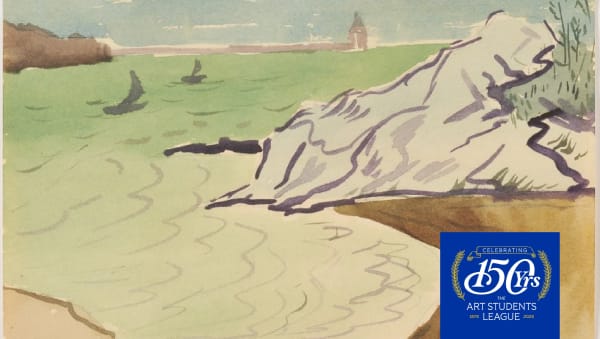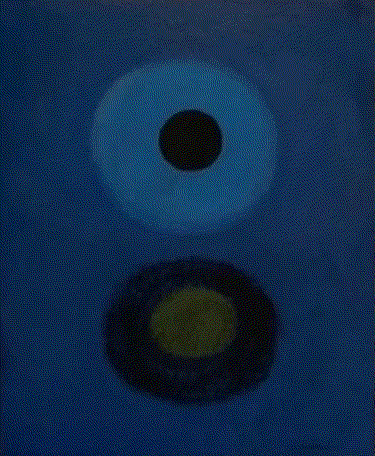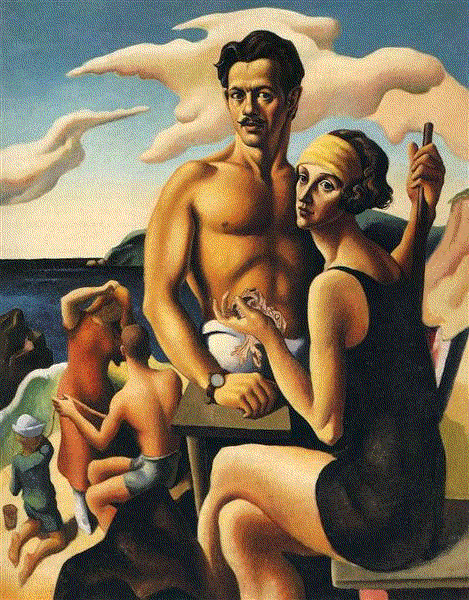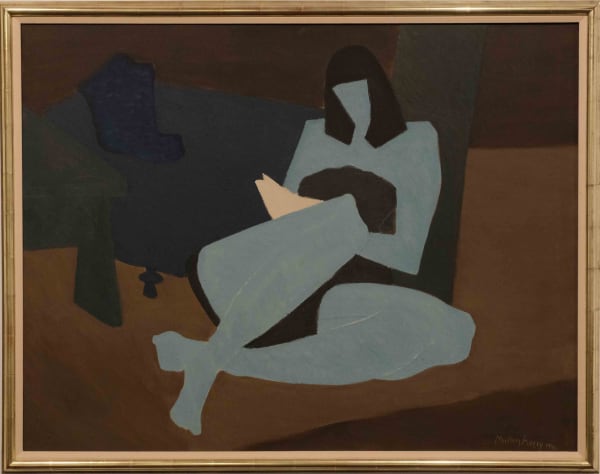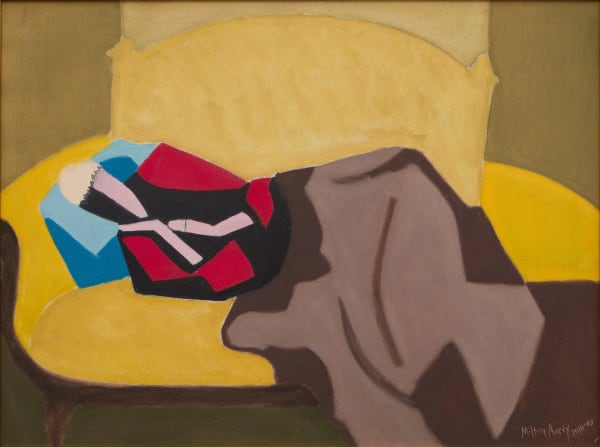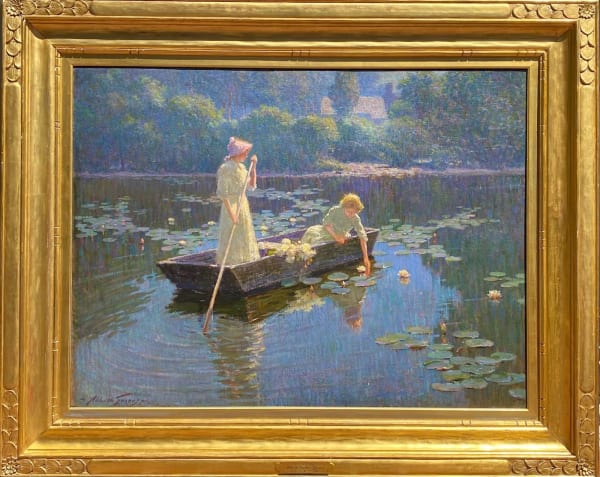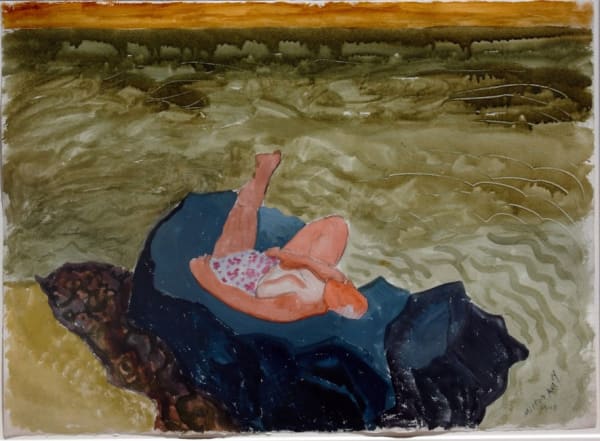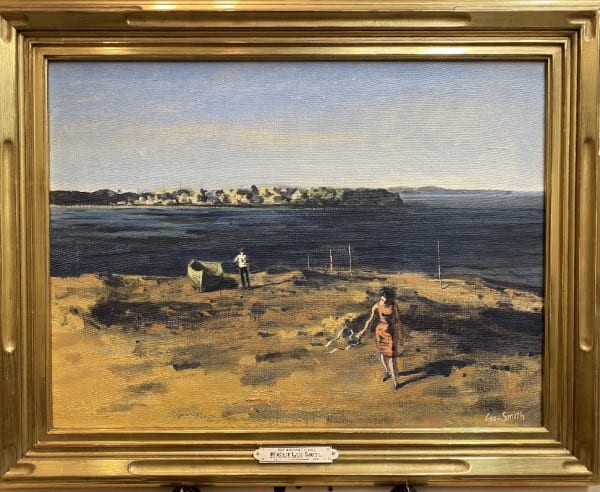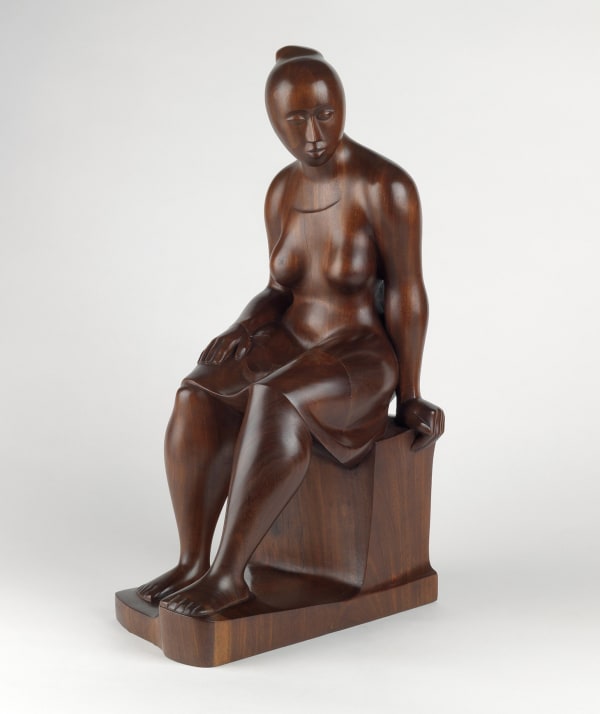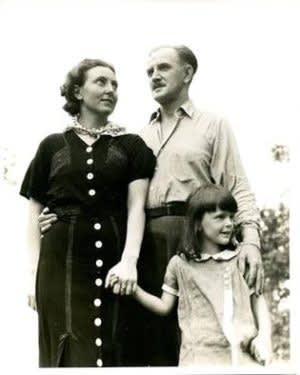Milton Avery
Through the harmonious blending of color and form, the work of Milton Avery appears quiet and serene, yet extremely powerful. In his own reserved way, Avery influenced a generation of painters, including Mark Rothko and Adolph Gottlieb.
The Early Years
Avery was born in 1885, in Altmar, a small town in upstate New York. His father was a tanner, who moved the family to a small town near Hartford, Connecticut when Avery was thirteen. The youngest of four children, Avery helped to support the family by doing factory work, starting at age sixteen.
A magazine ad that promised one could, “make money lettering” led Avery to take classes at the Connecticut League of Art Students in 1905. The lettering class was cancelled after just a month, but the founder of the school persuaded Avery to switch to a life-drawing class, instead of dropping out of the school. For years, Avery did factory work during the day and went to classes at night.
The deaths of his father, older brothers and his brother-in-law, left it up to Avery to support his mother, sister and sisters-in-law, which he did, while continuing to study art in the evenings. In 1917 Avery took a job on the night shift, as a file clerk for an insurance company, which enabled him to take classes at the School of the Art Society in Hartford.
When Avery Met Sally
Avery’s life, and certainly his luck, changed in 1924, when he met Sally Michel, an aspiring artist from Brooklyn. They were married in 1926 and moved to New York. Sally decided to support them both with her income as a freelance illustrator, so that Avery could focus completely on his art.
The couple was married for nearly forty years and had one child, March Avery Cavanaugh, an artist, and a grandson, Sean Avery Cavanaugh, also an artist.
In the late 1920s, Milton Avery, Mark Rothko, Adolph Gottlieb and other young artists exhibited their works at the city-subsidized Opportunity Gallery in New York. Avery’s work attracted the younger artists to his studio.
“I have always thought he was a great artist. When Social Realism and the American scene were considered the important thing, he took an esthetic stand opposed to regional subject matter.” Gottlieb said. “I shared his point of view; and since he was ten years my senior and an artist I respected, his attitude helped to reinforce me in my chosen direction. I always regarded him as a brilliant colourist and draftsman, a solitary figure working against the stream.”
Avery had his first solo exhibit in 1935, at the Valentine Gallery, which also represented Matisse. Avery remained with the gallery through 1941.
Later Years
Avery continued to paint throughout his lifetime, even through his recovery from a heart attack in 1949. During his convalescence, he created monotypes at the Research Art Colony in Maitland, Florida.
His work not only maintained the richness of color that inspired so many other artists, but seemed to become even stronger and more vibrant.
Sally Avery died in 2003, at the age of 100. When she met Avery, in 1924, she was 22 and he was nearly forty, so he told her he was about seven years younger than he actually was. She didn’t learn the truth about his age until 1982, when it was discovered by the curator of an exhibit of Avery’s work at the Whitney Museum of American Art.
Milton Avery died in 1965, at the age of 80. At Avery’s memorial service, Mark Rothko said this of his mentor and friend, “There have been several others in our generation who have celebrated the world around them, but none with that inevitability where the poetry penetrated every pore of the canvas to the very last touch of the brush. For Avery was a great poet-inventor who had invented sonorities never seen or heard before. From these we have learned much and will learn more for a long time to come.”
Avery’s works are in the permanent collections of museums in America and Europe, including the Boca Raton Museum of Art, the Metropolitan Museum of Art, the Brooklyn Museum, the Hirshhorn Museum and Sculpture Garden, the Museum of Fine Arts Boston, the National Gallery of Art, the New Orleans Museum of Art, the Philadelphia Museum of Art, the Smithsonian American Art Museum, the Museum of Modern Art, The Phillips Collection, the Toledo Museum of Art, the Whitney Museum of American Art and the Art Institute of Chicago.
Send me more information on Milton Avery
-

Appreciating Fairfield Porter
July 2, 2025Fairfield Porter is a painter of great refinement and subtlety. He has a strong technique and a wonderful sense of place…. The realistic world he...Read more -

The Art Students League Celebrates 150 Years
Showcased works by Milton Avery, Adolph Gottlieb and other Art Students League Alumni June 20, 2025The Art Students League of New York is celebrating its 150th anniversary with an exhibition of works by many of its most talented artists. The...Read more -

Avery, Gottlieb, Rothko: A Close-Knit Trio at the Phillips Center
April 3, 2025Avery's last works were as fresh as though he were a young painter and of course, they also had the authority of an old master....Read more -

The Innovators: Theodore Earl Butler and Milton Avery
Julian Opie's People Walking at Surovek Gallery March 13, 2025American artist, Theodore Earl Butler (1861-1936), bridged the gap between French and American Impressionism. He was, of course, profoundly influenced by his father-in-law, Claude Monet,...Read more -

Surovek Gallery at Art Miami 2024
November 27, 2024This year marks the 34th Edition of Art Miami and we are pleased to be a part of the city’s original and longest running modern...Read more -

Thomas Hart Benton and Loie Hollowell at the Hirshhorn
November 14, 2024I have a sort of inner conviction that for all the possible limitations of my mind and the disturbing effects of my processes, for all...Read more -

Milton Avery and the Federation of Modern Painters and Sculptors
August 14, 2024“ I like to seize the one sharp instant in Nature, to imprison it by means of ordered shapes and space relationships. To this end...Read more -

Milton Avery: The American Matisse
Jonas Wood's Homage to Matisse May 16, 2024Milton Avery’s paintings inspire feelings of serenity and joy. An artist’s artist, known as the American Matisse , Avery was also an inspiration to younger...Read more -

Masters of Color: Hunt Slonem and Wolf Kahn
December 14, 2023Hunt Slonem (b.1951) surrounds himself with color. Pinks, violets, yellows …. are on the walls of his studio, his homes and on the feathers of...Read more -

Surovek Gallery at Art Miami 2023
November 30, 2023At Surovek Gallery our focus is on the finest American paintings, drawings, watercolors and prints of the 19th, 20th and 21st centuries; the oeuvre which...Read more -

Recent Acquisitions at Surovek Gallery
Works by Abbott Fuller Graves, Thomas Hart Benton, Milton Avery, Sam Francis, Orville Bulman, Kenneth Noland and Mel Bochner September 29, 2023We are pleased to announce our recent acquisitions of works by some of America’s finest artists, representing a wide range of styles and techniques. The...Read more -

The Work of Wolf Kahn at Surovek Gallery
September 21, 2023Kahn’s beautiful landscapes of the views around their summer home in Brattleboro, Vermont are full of magnificent colors and a sense of serenity. Ironically, Kahn completed them in his Manhattan studio, above the noise and bustle of the city. "The environment in which my paintings grow best is at Broadway and 12th Street." he said. "I can see nature most clearly in my studio, undistracted by trees and skies. Art being emotion recollected in tranquility, I constantly find Nature too emotional, and Broadway very tranquil.”Read more -

Milton Avery and Wolf Kahn: Summer Scenes at Surovek Gallery
June 29, 2023One must maintain a little bit of summer, even in the middle of winter. – Henry David Thoreau Summer brings us long, sunny days, warm...Read more -

Milton Avery: Traveling Retrospective; Artle: Wordle for Art Lovers
August 2, 2022Milton Avery 1885-1965 The works of Milton Avery are serene, yet powerful, much like the man himself. At age 16, Avery became the sole support...Read more -

Watercolor Masterpieces at Surovek Gallery
March 22, 2022Watercolor painting dates back to prehistoric times. Pigments from plants were mixed with water, applied with fingers, sticks and bones, to create cave paintings. Ancient...Read more -

Milton Avery, Jonas Wood and Jeff Koons at Surovek Gallery
February 23, 2022Milton Avery 1885-1965 An exhibit of the works of Milton Avery has traveled from the Modern Art Museum of Fort Worth to the Wadsworth Atheneum...Read more -

Surovek Gallery at the 2021 Miami Art Fair
November 22, 2021We are pleased to announce that Surovek Gallery will be represented at the 31st edition of Art Miami . The exhibit will run from November...Read more -

Milton Avery and Elizabeth Catlett at Surovek Gallery
August 18, 2021Milton Avery 1885-1965 London's Royal Academy of Arts is holding the first comprehensive exhibit of Milton's Avery's work in Europe. Milton Avery was an artist's...Read more -

Summer with Milton Avery at Surovek Gallery
July 18, 2020Like many artists, Milton Avery was influenced by the time he spent painting during the summer, sometimes with other artists, sometimes in solitude. Milton Avery...Read more -

Milton Avery: Summer with the Averys
May 9, 2019I try to construct a picture in which shapes, spaces, colors, form a set of unique relationships, independent of any subject matter. At the same...Read more



